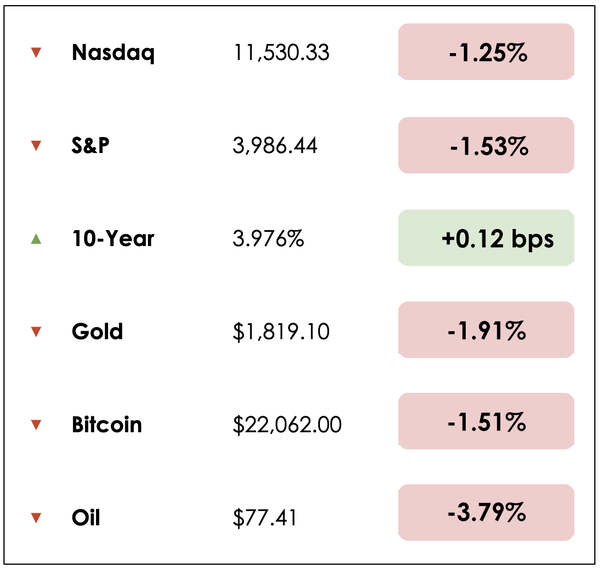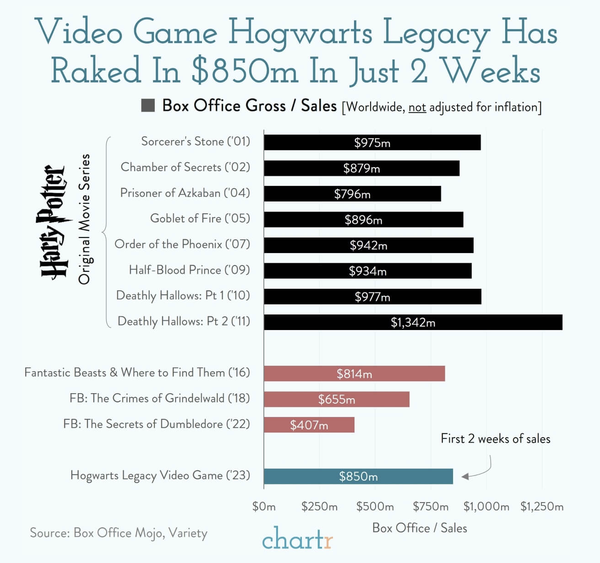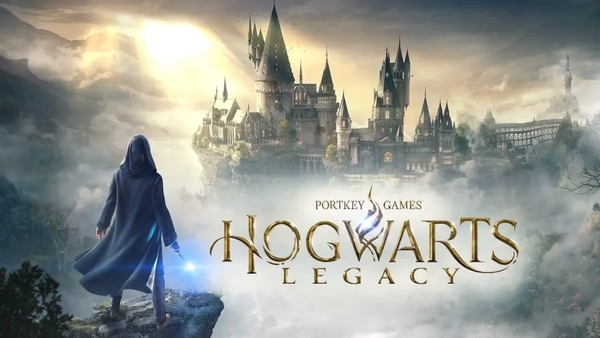The Magic Is Back

Hi, The Investor’s Podcast Network Community!
(Want to listen to this newsletter? Checkout the link at the top.)
Add to Jerome Powell’s résumé a new title: Expectations Setter for markets.
🚔 For months, the Fed chairman has played the role of “bad cop,” consistently warning investors to limit their enthusiasm because rates won’t be falling anytime soon, at least not before inflation is clearly under control.
It’s no fun, but someone has to do it, because monetary policy’s effectiveness largely relies on effective communication.
And the chief setter of expectations was back at it again today, telling the world in a speech before the Senate Banking Committee that strong economic data may force rates even higher, and for longer, than previously expected ⏳
Stocks, as intended, didn’t react well:
MARKETS
*All prices as of market close at 4pm EST
Today, we’ll discuss two items in the news:
- How A.I. is helping spot cancer
- The problem with parking lots
- Plus, our main story on Warner Bros and how it’s using nostalgia to reinvent itself
All this, and more, in just 5 minutes to read.
Get smarter about valuing businesses in just a few minutes each week.
Get the weekly email that makes understanding intrinsic value
easy and enjoyable, for free.
History of positive returns ✔️
Inflation-hedging potential ✔️
Resistance to market volatility ✔️
Land has helped investors preserve wealth for generations, and AcreTrader makes it easy to diversify with farm and timberland assets online — Find out how.
IN THE NEWS
🤖 A.I to Spot Cancer (NYT)
Explained:
- Advancements in A.I. are starting to deliver breakthroughs in breast cancer screening by detecting signs that doctors miss. The technology shows an impressive ability to spot cancer at least as well as human radiologists, one of the most tangible signs yet of how A.I. can improve public health.
- Look no further than Hungary, which has a robust breast cancer screening program and is one of the largest testing grounds on real patients. Clinics and hospitals in the U.S., Britain, and the European Union are also testing the systems.
- Experts point to a potential future where thousands of lives are saved each year – and, in turn, millions of dollars – thanks to early detection by A.I.
Why it matters:
- While A.I. has become the center of a Silicon Valley boom, the breast cancer screening technology shows other ways A.I. can seep into everyday life, improve lives, and maybe even save them.
- The technology still faces hurdles. More trials are needed, the tool must be accurate on women of all ages, ethnicities, and body types, and it must prove it can recognize complex forms of breast cancer and cut down on false positives that are not cancerous.
- In 2020, there were 2.3 million breast cancer diagnoses and 685,000 deaths from the disease, per the World Health Organization.
- Experts say A.I. could work best as a complement to human doctors, rather than a replacement, just as the internet and other technological advancements amplify a doctor’s skills rather than diminish them.
🚗 Parking Lots Shape Society (NYT)
Explained:
- Cities are rethinking their need for parking spaces, scaling back the minimum number of spots for shopping centers and apartment complexes. Simply: In many cities, there are too many parking spots.
- Some city leaders blame the parking spaces for societal woes, including the housing crisis, climate change, and the rise in fatalities among pedestrians and cyclists.
- The U.S. has about 2 billion parking spots, nearly seven for every car. In some cities, as much as 14% of the land area is covered with black asphalt. The country is “awash in parking spots,” which stems from America’s longstanding love affair with the automobile.
Why it matters:
- Others point out that more parking encourages car ownership and use, separates businesses and spreads out cities, leading to more driving and parking, even in areas with mass transit.
- More parking spaces also can constrain developers, who need to allot precious space to parking, driving up costs often passed on to tenants and customers, exacerbating the lack of affordable housing in major cities.
- Said one expert: “We need more housing, we need more density in certain cities. Converting parking or lowering the parking requirement, that’s how you get there.”
The magic is back
Hogwarts fever is back in the air, and it’s not due to a new movie, nor is J.K. Rowling sparking controversy. Rather, a new game, Hogwarts Legacy, is smashing records, bringing a little magic back into people’s lives.
In Warner Bros’ recent earnings report, we learned that the game generated an incredible $850 million in sales in its first two weeks after launching on February 10th. That puts it in good company amongst the fastest-selling games in history, bested by Grand Theft Auto V, which earned an almost unbelievable $1 billion in just three days in 2013.
Gamers logged some 280 million hours of total playtime in its first few weeks. Set two hundred years before Hagrid uttered these famous words, “You’re a wizard, Harry,” the game enables players to embark on an epic journey in the 1800s as a fifth-year student at Hogwarts.
Becoming a mega-franchise
The Harry Potter series has written the script for becoming a mega-franchise, starting with books, then movies and merchandise, and now a hit game (with plenty of spinoff movies and a rumored spinoff TV show as well).
An interesting exception to this mega-franchise playbook, also belonging to Warner Bros, is HBO’s latest hit show, The Last of Us. The show is inspired by the popular game of the same name, set in an apocalyptic world where a pandemic spread by mushrooms has wiped out humanity.
Still, the Hogwarts game’s recent success is a good reminder that people love Harry Potter. It’s also a reminder that the video game industry is huge. Estimates grouping together mobile, console, and PC gaming suggest the industry does over $175 billion in revenue annually. For context, that’s seven times bigger than the global box office.
Pandemic gaming
The pandemic’s onset spurred a monster surge in gaming. Spending on games rose a record 23% in 2020, according to the Wall Street Journal. Mobile gaming, in particular, is taking over as revenue jumped 4.4% to almost $91 billion in 2021. And it appears the industry will only keep growing rapidly.
The gaming giant Activision Blizzard’s president argues, “If your mission is to connect players around the world, you absolutely have to have an entry point with mobile.” The gaming industry, then, is set to use mobile as a funnel to pull people into gaming on other platforms.
Look no further than Activision’s iconic Call of Duty Franchise, which debuted on mobile in 2019 and garnered more than 100 million downloads in its first week.
A turnaround story
When you have a hit franchise like Harry Potter to fall back on, you can bypass mobile. The breakout success from Hogwarts Legacy has helped fuel a 65% rally in Warner Bros Discovery’s stock. And the company’s CEO has noted that the hit video game business is now a “core part of our overall strategy.”
Things aren’t all smooth sailing, though. Warner Bros reported a 9% decline in overall revenues last quarter to $11 billion. A big driver of this weakness was the TV networks segment, where channels like CNN, TBS, and HGTV faced a 14% drop in advertising revenue.
On the streaming front, things were a bit better. Warner Bros Discovery operates both HBO Max and Discovery+, which reported a combined increase in subscribers of 1.1 million, totaling 96.1 million subscribers last quarter. This strength, in part, is likely attributable to the video game-inspired show The Last of Us on HBO.
Reviving treasured early-2000s franchises seems to be a central part of the company’s efforts to rejuvenate itself, announcing plans recently to make new Lord of the Rings films after striking a deal with Embracer Group, which owns the film rights to J.R.R Tolkien’s books. Middle-earth fans rejoice.
Whether you’re a fan of The Last of Us (I, Shawn, happen to be a big one), a lover of all things Lord of the Rings, or a gamer enjoying Hogwarts Legacy, Warner Bros is churning out some compelling and popular content, and they’re leveraging franchises with proven track records, either as books, movies, or video games.
Explore Warner Bros Discovery’s latest earnings report.
SEE YOU NEXT TIME!
That’s it for today on We Study Markets!
See you later!
If you enjoyed the newsletter, keep an eye on your inbox for them on weekdays around 6pm EST, and if you have any feedback or topics you’d like us to discuss, simply respond to this email.











